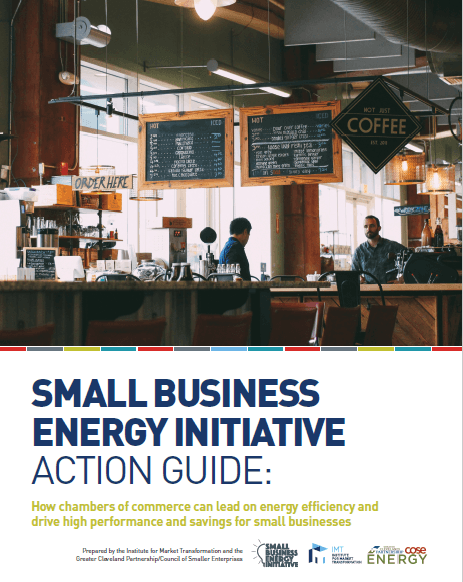The Small Business Energy Initiative is led by the Institute for Market Transformation (IMT) and the Greater Cleveland Partnership/Council of Smaller Enterprises (GCP/COSE). With support from the U.S. Department of Energy, the Initiative is partnering with local chambers of commerce and similar small business organizations from five regions across the country to arm them with leading-edge tools, best practices, and guidance to create energy efficiency and sustainability opportunities for their small business members that are good for the bottom line and good for the planet. In our monthly Q&A series, we’ll learn from the changemakers who are rolling up their sleeves every day to build an energy-efficient and prosperous future for their business members and local communities.
 Nicole Stika, GCP/COSE’s Vice President of Energy Services, shares how she leads the chamber’s efforts to ensure Northeast Ohio’s small businesses have greater access to energy efficiency opportunities and are given a stronger voice when it comes to state and local policies and efficiency programs offered by utilities.
Nicole Stika, GCP/COSE’s Vice President of Energy Services, shares how she leads the chamber’s efforts to ensure Northeast Ohio’s small businesses have greater access to energy efficiency opportunities and are given a stronger voice when it comes to state and local policies and efficiency programs offered by utilities.
Can you tell us about GCP/COSE and how its energy program was first created? When did you start leading its energy initiatives?
The Council of Smaller Enterprises, also known as COSE, is the Greater Cleveland Partnership’s [Cleveland’s Chamber of Commerce] small business arm and is Ohio’s largest small business support organization. COSE started its energy program as a result of utility deregulation in Ohio, which was meant to provide residents and businesses more choices for where they get their power.
I first joined GCP/COSE in 2004, and in 2008 shifted my role to start and lead the energy department. At that time Ohio passed a bill that mandated the state’s utilities to meet Renewable Portfolio Standards and an energy efficiency requirement, however, it meant that businesses would incur additional costs. So COSE wrote an amendment to that legislation to specifically allocate budget to education and resources for small businesses. We saw that residential groups, industrial groups, manufacturers, and consumer groups all had a seat at the table, but there was a lack of representation for small businesses—our role was to provide them a voice.
Following the bill’s passage, COSE was designated by the Public Utilities Commission of Ohio (PUCO) as an administrator for the utility FirstEnergy. When FirstEnergy launched their energy efficiency programs in 2009, not only did COSE help our business members take advantage of savings opportunities through the utility’s programs, we also designed strategies for energy management, provided energy assessments, and established a network of trusted contractors for efficiency projects.
Do you think it’s important for other chambers of commerce and similar small business organizations to get involved with energy efficiency and clean energy? Why?
Absolutely. Energy efficiency programs allow chambers to create a niche and provide an even stronger case for why businesses should join their membership. Leading on clean energy makes chambers thought leaders, provides an avenue to form new relationships and networks, and leads to meaningful results for businesses and local communities. I mentioned how COSE established an energy contractor network—this led to a new level of engagement that didn’t exist before. Contractors don’t typically attend chamber events to build relationships, so this was a new way to engage a broad network of service companies such as lighting, HVAC, general contractors, electricians, and solar companies and to introduce them to member businesses.
Small businesses also don’t usually know who to talk to or where to start when it comes to addressing energy usage, so providing them with the ability to base their decisions on a chamber’s recommendations adds significant value to any membership. COSE’s whole approach is to make sure it provides resources for businesses to be successful, as well as to retain and attract them to our region. If a chamber is considering energy efficiency, it’s best to think of it as a way to drive economic development in a region, and to help businesses think differently about how they’re operating and how to incorporate long-term needs into their budget and strategic plans. Because saving energy is as much about the bottom line as it is about doing what’s right for the environment.
Can you provide a favorite example of how you have helped a member business save energy or meet its environmental goals through the Small Business Energy Initiative?
MAN Holdings LLC, which is a small privately-owned real estate investment firm, recently moved to Cleveland and purchased a commercial building—COSE performed an energy audit for the firm and lined it up with local contractors and helped it secure rebates. We then connected them with Commercial PACE financing, which will finance a deep energy retrofit and a rooftop solar installation for the building.
IMT provided green lease recommendations, which MAN Holdings incorporated into its leases. A nonprofit in the building has a funder that requires the organization to have environmental goals, and because of the way MAN Holdings implemented a green lease, the nonprofit chose to move into their building and instead of another. I love this example because it shows the benefits of green leasing, it highlights a business owner that fully embraces energy efficiency and sustainability, and it illustrates a holistic approach to building energy performance. MAN Holdings recently purchased another building and it plans to go through the same process to turn it into a more efficient and higher-performing one.
What are you most excited about for COSE’s energy program and the Small Business Energy Initiative heading into 2019?
I’m excited about COSE’s strategic plan for 2019, which cuts across many places of impact where we can drive business investment in efficiency and sustainability. Energy fits into several of our focus areas, such as real estate and business development. We are working to change the conversation for developers and business owners as they look to expand, relocate, or make building improvements so that energy efficiency is integrated into the process from the beginning, more than ever before. We aim to convert more energy audits convert into projects, and on a shorter timeline and have those projects go beyond the low hanging fruit of lighting to be more holistic.
For the Small Business Energy Initiative, I’m looking forward to seeing our chamber and small business organization partners continue down the path they are on to make energy efficiency a strategic offering for their business members. COSE and IMT created this initiative in part to grow a network for sharing best practices and I foresee our partners supporting one another, whether it’s figuring out the best ways to engage a utility or approaching energy efficiency programs from a revenue-generating perspective and helping one another find answers to challenges.
What is something people may not know about you?
I represented COSE at the International Chambers of Commerce’s World Chambers Federation’s 8th World Chambers Congress in Doha, Qatar, which was a wild experience. I was invited to participate as a panelist and to strengthen regional and global ties with fellow chamber leaders. GCP/COSE was one of four U.S. chambers of commerce among other global business leaders, showcasing itself as one of the leading chambers in the space of energy efficiency and sustainability. I spoke at the Congress’s Building Sustainable Solutions workshop, which focused on how countries all over the world are looking toward the green economy to encourage innovation and competitiveness, create new jobs, technologies and trade opportunities, while also reducing social disparities.

